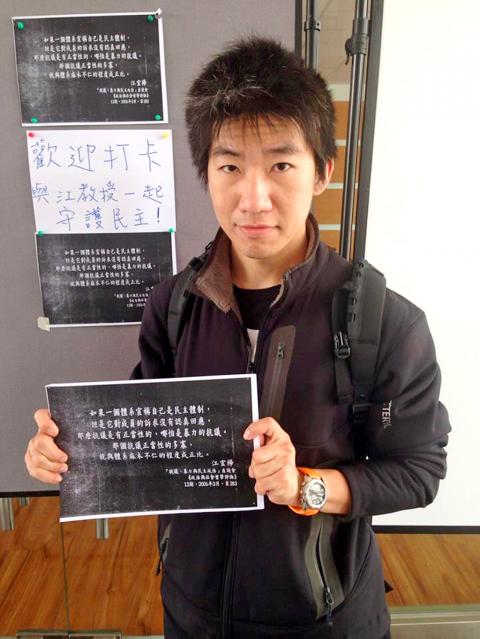A dentist who participated in the Sunflower movement and visited Hong Kong in support of the “Umbrella movement” was refused entry into Macau by customs officials who said he was a “threat to internal security and stability.”
Shih Shu-hua (史書華), a member of a medical volunteer group during the Sunflower movement in March and April last year, said on Facebook that he had a “special experience” on Friday.
He was also denied a Hong Kong visa when trying to register for a planned entry on Thursday, which he attributed to an October visit. On that trip, during protests demanding democratic Hong Kong leadership elections, he made an onstage speech of support.

Photo: Screengrab from FattyMagic’s Facebook page
“I kind of expected the Macau rejection after I could not register for a Hong Kong visa,” he said.
Shih and his wife flew to Macau on Friday, but officials took him to a room where he was asked to wait and fill out forms, he said.
“The police kept saying that they knew nothing when [I] posed a series of questions, stressing that it was another unit that wanted to keep me there,” Shih said.
He called the Taipei Economic and Cultural Office (TECO) in Macau and asked about being blacklisted by Chinese authorities.
“They confirmed the existence of a blacklist and said I might run into trouble if my name is identical to one of those listed,” Shih said.
Shih said he was told by Macau police that he would not be able to enter the enclave and was asked to sign a notice of refused entry.
The reason given was “to bar the entry of non-locals who pose a threat to ... security and stability.”
Mainland Affairs Council spokesperson Wu Mei-hung (吳美紅) told the Taipei Times that she has confirmed with the TECO in Macau that Shih did call the office for assistance on Friday.
“Our office contacted the Macau authorities and inquired into the matter. They said they were not able to provide the exact reason why Shih was rejected,” Wu said. “We would have TECO in Macau express our concerns to the government and call for its respect of our people’s rights of entry ... for tourism and business.”

Taiwan is projected to lose a working-age population of about 6.67 million people in two waves of retirement in the coming years, as the nation confronts accelerating demographic decline and a shortage of younger workers to take their place, the Ministry of the Interior said. Taiwan experienced its largest baby boom between 1958 and 1966, when the population grew by 3.78 million, followed by a second surge of 2.89 million between 1976 and 1982, ministry data showed. In 2023, the first of those baby boom generations — those born in the late 1950s and early 1960s — began to enter retirement, triggering

ECONOMIC BOOST: Should the more than 23 million people eligible for the NT$10,000 handouts spend them the same way as in 2023, GDP could rise 0.5 percent, an official said Universal cash handouts of NT$10,000 (US$330) are to be disbursed late next month at the earliest — including to permanent residents and foreign residents married to Taiwanese — pending legislative approval, the Ministry of Finance said yesterday. The Executive Yuan yesterday approved the Special Act for Strengthening Economic, Social and National Security Resilience in Response to International Circumstances (因應國際情勢強化經濟社會及民生國安韌性特別條例). The NT$550 billion special budget includes NT$236 billion for the cash handouts, plus an additional NT$20 billion set aside as reserve funds, expected to be used to support industries. Handouts might begin one month after the bill is promulgated and would be completed within

NO CHANGE: The TRA makes clear that the US does not consider the status of Taiwan to have been determined by WWII-era documents, a former AIT deputy director said The American Institute in Taiwan’s (AIT) comments that World War-II era documents do not determine Taiwan’s political status accurately conveyed the US’ stance, the US Department of State said. An AIT spokesperson on Saturday said that a Chinese official mischaracterized World War II-era documents as stating that Taiwan was ceded to the China. The remarks from the US’ de facto embassy in Taiwan drew criticism from the Ma Ying-jeou Foundation, whose director said the comments put Taiwan in danger. The Chinese-language United Daily News yesterday reported that a US State Department spokesperson confirmed the AIT’s position. They added that the US would continue to

The National Development Council (NDC) yesterday unveiled details of new regulations that ease restrictions on foreigners working or living in Taiwan, as part of a bid to attract skilled workers from abroad. The regulations, which could go into effect in the first quarter of next year, stem from amendments to the Act for the Recruitment and Employment of Foreign Professionals (外國專業人才延攬及僱用法) passed by lawmakers on Aug. 29. Students categorized as “overseas compatriots” would be allowed to stay and work in Taiwan in the two years after their graduation without obtaining additional permits, doing away with the evaluation process that is currently required,